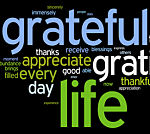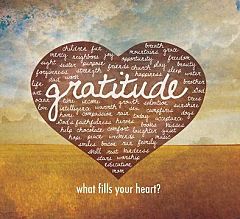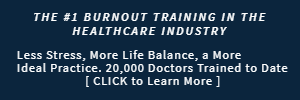 A Gratitude Journal is a powerful weapon in the fight against Physician Burnout
A Gratitude Journal is a powerful weapon in the fight against Physician Burnout
A large body of research shows a weekly Gratitude Journal is a simple way to help anyone - even physicians - be healthier and happier. It is an antidote to our constant focus on disease, problems and the frustrations of modern medical practice.
In this article I will share the research evidence for the effectiveness of gratitude, including a gratitude bibliography, and show you five keys to a maximally effective Gratitude Journal. Hint: there is a dose response curve. If you over do it, even gratitude loses effectiveness.
Perhaps the biggest danger of never counting your blessings I have noticed is this ...
Without a regular practice of gratitude, you are at high risk for falling into "Eeyore Mode".
 You remember Eeyore. He is the donkey in the Winnie the Pooh stories who is always losing his tail. Many of my physician burnout coaching clients sound just like Eeyore when I first meet them over the phone.
You remember Eeyore. He is the donkey in the Winnie the Pooh stories who is always losing his tail. Many of my physician burnout coaching clients sound just like Eeyore when I first meet them over the phone.
Often I am not the first person to tell them about this resemblance. They are no fun to be around. It is a real bummer for your staff, family and significant other to listen to the continuous whining.
Eeyore Mode is very common among physicians and totally avoidable.
We are trained to be Eeyore
Given the conditioning of our medical education, it is no wonder that we often feel hemmed in by problems and overwhelm on all sides.
We are trained over a minimum of 7 years of med school and residency to diagnose and treat. We are taught to find the "unifying diagnosis" and focus everyone's efforts on eliminating this problem. At no point in our medical education are we taught how to devote any shred of our awareness to the things that are going right in our own life or the lives of our patients. Eeyore is the natural result.
Gratitude Journal Power Tips and the way out of Eeyore Mode
Understand that the gratitude journal has been studied scientifically for years now. The research evidence is strong for the following key benefits ... all of which help combat physician burnout.
The benefits of a Gratitude Journal:
Physical
- Stronger immune systems
- Less bothered by aches and pains
- Lower blood pressure
- Exercise more and take better care of their health
- Sleep longer and feel more refreshed upon waking
Psychological
- Higher levels of positive emotions
- More alert, alive, and awake
- More joy and pleasure
- More optimism and happiness
Social
- More helpful, generous, and compassionate
- More forgiving
- More outgoing
- Feel less lonely and isolated
(Table above is from Robert Emmons and the Greater Good Science Center at U.C. Berkeley)
Getting started - remember you already know how to do this
A Gratitude Journal is just a variation on saying grace.
Taking a moment to be thankful for your blessings. Grace is a system of giving thanks. It is a pattern of slowing down and saying thank you in specific situations with your family. A Gratitude Journal is just saying grace on paper.
5 Gratitude Journal Power Tips:
Research shows these five steps give you the most effective way to write in your Gratitude Journal if more happiness and satisfaction - and less physician burnout - is what you are seeking.
 ~ Write it down
~ Write it down
Putting your "things I am grateful for" list down on paper is important.
~ Note three to five things you are grateful for
This does not have to be a big list.
~ Pause for a moment to imagine what it would be like if these things were not in your life
Your gratitude becomes crystal clear when you imagine the absence of the good stuff. Just like George Bailey in "It's a wonderful life".
~ Feel the gratitude for their blessings
... really ... take a couple breaths to really feel the blessings.
~ Do this just once a week
Yes there really is a gratitude dose response curve. Once a week is optimal. You can easily tack it onto your Schedule HACK activities on Sundays and make it a gratitude session for the whole family.
If you need help getting started lower your standards!
Here are some things you might not notice right off the bat that you are most assuredly very grateful for
- Indoor plumbing
- Hot water
- A roof over your head
- None of your teeth hurt right now
When you start to look at gratitude regularly, you will begin to notice all blessings raining down on you 24/7. Your Gratitude Journal gives you a weekly shift in perspective and keeps Eeyore at bay.
This is not just Positive Thinking or Pop Psychology
It is much more powerful than that.
- I am not telling you ignore your problems or think they are some kind of twisted blessing
- I am not telling you to stop working your improvement plans at work or give up on your big vacation this year
- The research community and I ARE highly recommending you take just 10 minutes a week to balance your awareness and focus on the things you are grateful for. It is research proven to make a positive difference in your life, help protect you from physician burnout and give you a powerful weapon in the battle against Eeyore.
==========
Gratitude Journal Bibliography:
(Adapted from the Gratitude Wikipedia page)Emmons Lab. (2014, January 27). Gratitude and well-being. Retrieved April 9, 2014.
Emmons, R. A., & McCullough, M. E. (2003). Counting blessings versus burdens: An experimental investigation of gratitude and subjective well-being in daily life. Personality & Social Psychology, 88, 377-389.
Froh, Jeffrey J., William J. Sefick, and Robert A. Emmons. "Counting Blessings in Early Adolescents: An Experimental Study of Gratitude and Subjective Well-being." Journal of School Psychology 46.2 (2008): 213-33.
Parks , A, C, Della Porta, M. D., Pierce, R. S., Zilca, R., Lyubomirsky, S. (2012). Pursuing happiness in everyday life: The characteristics and behaviors of online happiness seekers. Emotion, 12(6). 1222-1234.
Seligman, M.; Steen, T.A.; Park, N. and Peterson, C. (2005). “Positive psychology progress: Empirical validation of interventions,” American Psychologist, 60:410-421.
Lyubomirsky, S., Sheldon, K. M., & Schkade, D. (2005) Pursuing happiness: The architecture of sustainable change. Review of General Psychology, 9(2), 111-131.
Seligman, M.; Steen, T.A.; Park, N. and Peterson, C. (2005). “Positive psychology progress: Empirical validation of interventions,” American Psychologist, 60:410-421.
Emmons, R. A., & McCullough, M. E. (2003). Counting blessings versus burdens: An experimental investigation of gratitude and subjective well-being in daily life. Personality & Social Psychology, 88, 377-389.
The Greater Good Science Center at University of California at Berkeley. (2011, November 17). Tips for keeping a gratitude journal. Retrieved April 9, 2014, from http://greatergood.berkeley.edu/article/item/tips_for_keeping_a_gratitude_journal
Lyubomirsky, S., Sheldon, K. M., & Schkade, D. (2005) Pursuing happiness: The architecture of sustainable change. Review of General Psychology, 9(2), 111-131.
The Greater Good Science Center at University of California at Berkeley. (2011, November 17). Tips for keeping a gratitude journal. Retrieved April 9, 2014, from http://greatergood.berkeley.edu/article/item/tips_for_keeping_a_gratitude_journal
Seligman, M.; Steen, T.A.; Park, N. and Peterson, C. (2005). “Positive psychology progress: Empirical validation of interventions,” American Psychologist, 60:410-421.
Emmons, R. A., & McCullough, M. E. (2003). Counting blessings versus burdens: An experimental investigation of gratitude and subjective well-being in daily life. Personality & Social Psychology, 88, 377-389.
The Greater Good Science Center at University of California at Berkeley. (2011, November 17). Tips for keeping a gratitude journal. Retrieved April 9, 2014, from http://greatergood.berkeley.edu/article/item/tips_for_keeping_a_gratitude_journal
==========
PLEASE LEAVE A COMMENT:
What are you grateful for and what is your experience with a Gratitude Journal?


 A Gratitude Journal is a powerful weapon in the fight against Physician Burnout
A Gratitude Journal is a powerful weapon in the fight against Physician Burnout
